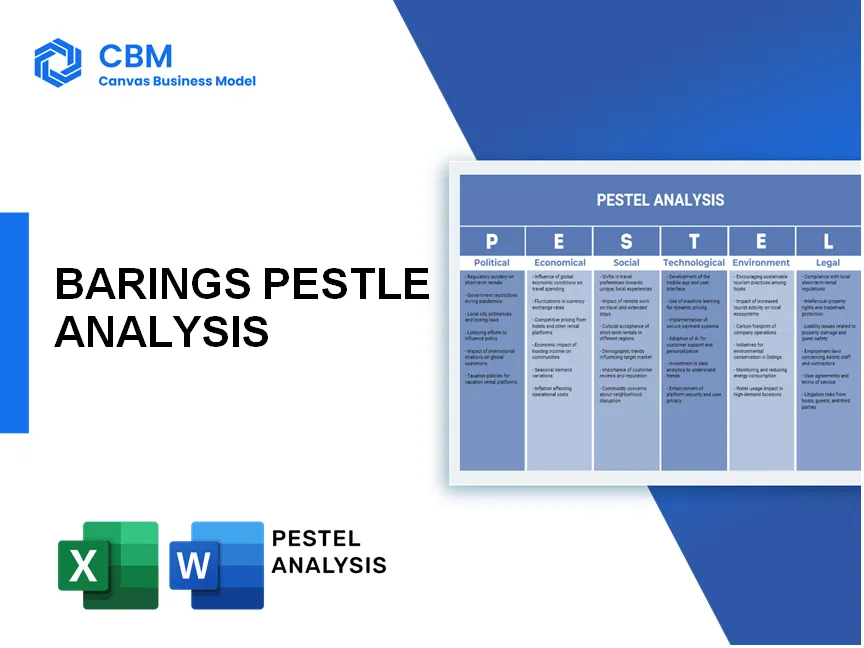In the dynamic world of finance, understanding the multifaceted forces that shape investment landscapes is vital. This PESTLE analysis of Barings—one of the leading global financial services firms—delves into the political, economic, sociological, technological, legal, and environmental factors influencing its operations. From regulatory changes impacting market confidence to the growing emphasis on sustainable investing, uncover how these elements intertwine to create both challenges and opportunities. Read on to explore the diverse influences driving Barings’ strategic decisions.
PESTLE Analysis: Political factors
Regulatory changes impacting financial services
In 2020, the global financial services industry faced increased regulatory scrutiny, with 38% of global bank executives indicating that compliance costs are rising. In the United States, the Dodd-Frank Act imposed an estimated annual compliance cost of $36 billion across the industry.
In Europe, the implementation of MiFID II in 2018 altered the landscape, affecting over $2 trillion in asset management activities.
Trade relations affecting investment strategies
The ongoing trade tensions between the U.S. and China had resulted in an estimated $370 billion loss in revenue across various industries, including financial services. Tariffs have made certain investment strategies less viable, as evidenced by a 15% decline in U.S.-China trade relations affecting financial flows in 2019.
Government stability influencing market confidence
According to the Global Peace Index 2021, countries like Venezuela ranked poorly at 149, causing significant investment flight. In contrast, countries like Switzerland maintain high stability ratings with a score of 1.32, marking it as an attractive destination for investment.
Tax policies and incentives for investment firms
The U.S. Tax Cuts and Jobs Act of 2017 reduced the corporate tax rate from 35% to 21%, significantly impacting firm profitability. Additionally, in 2020, the UK announced a reduction of Corporation Tax from 19% to 17%, aimed at attracting foreign investment, which raised investment flows by 22% from 2018 to 2020.
| Country | Corporate Tax Rate (%) | Investment Growth Rate (2018-2020) (%) |
|---|---|---|
| United States | 21 | 15 |
| United Kingdom | 17 | 22 |
| Germany | 30 | 10 |
| France | 32.02 | 8 |
International sanctions that may restrict operations
As of 2021, U.S. sanctions against Iran have blocked approximately $100 billion in potential investments. Similarly, sanctions on Russia have led to an estimated decline of $200 billion in foreign direct investment since 2014.
The European Union maintains sanctions on 177 individuals and entities related to the conflict in Ukraine, creating challenges for firms like Barings looking to navigate political risks.
[cbm_pestel_top]
PESTLE Analysis: Economic factors
Fluctuations in global markets affecting investment returns
In 2023, the MSCI All Country World Index (ACWI) reported a year-to-date return of -18.9% through September. Barings, as a global investment firm, experiences the impact of these market movements on their portfolio performance, reflecting a challenging investment landscape.
Equity markets faced volatility, with the S&P 500 showing fluctuations between a high of 4,800 points and a low of 3,600 points in 2023, which notably affects investment strategies.
Interest rates influencing borrowing costs and investment strategies
The Federal Reserve maintained an interest rate range of 5.25% to 5.50% as of September 2023, subsequently affecting borrowing costs for corporations and individuals alike. This interest rate environment has led to increased costs of capital, influencing investment decisions across the board.
For Barings, investing in fixed-income assets amidst rising interest rates has seen challenges. The average yield for U.S. corporate bonds has hovered around 4.8% in 2023.
Impact of inflation on asset valuation
As of August 2023, the Consumer Price Index (CPI) showed an inflation rate of 3.7% in the U.S., prompting consideration for asset valuation adjustments. This inflation rate influences real returns on investments and necessitates strategic shifts in investment allocations.
The expected erosion of purchasing power may require Barings to reassess its portfolio in response to inflationary pressures.
Economic growth trends in key markets
According to the International Monetary Fund (IMF) World Economic Outlook, the global growth forecast for 2023 stands at 3.0%. In this landscape, the U.S. is projected to grow at 2.1%, while the Eurozone is expected to hover around 0.9%.
Emerging markets, particularly in Asia, are anticipated to see a growth rate of approximately 4.5%, providing investment opportunities for Barings in those regions.
| Region | Growth Rate (%) |
|---|---|
| Global | 3.0 |
| United States | 2.1 |
| Eurozone | 0.9 |
| Emerging Markets | 4.5 |
Currency exchange rates affecting international investments
The fluctuations in currency exchange rates have a significant impact on the valuation of Barings' international investments. As of September 2023, the exchange rate between the U.S. dollar and the Euro stood at 1.08 USD for 1 EUR.
Additionally, the Japanese Yen traded at approximately 146 JPY per 1 USD, impacting the returns on investments in Japan.
| Currency Pair | Exchange Rate |
|---|---|
| USD/EUR | 1.08 |
| USD/JPY | 146 |
| GBP/USD | 1.25 |
| AUD/USD | 0.66 |
PESTLE Analysis: Social factors
Sociological
Shifts in investor demographics and preferences
The demographic shift is significant, with millennials and Generation Z increasingly participating in the investment landscape. According to a 2021 report by Deloitte, about 71% of millennials prioritize the ethical implications of their investments. Furthermore, 60% of these investors express a preference for socially responsible investment options. By 2030, millennials are projected to control more than $30 trillion in assets.
Growing interest in sustainable and responsible investing
The global sustainable investment market reached $35.3 trillion in assets under management (AUM) as of 2020, which is a 15% increase since 2018, according to the Global Sustainable Investment Alliance. Moreover, a 2021 survey by the Morgan Stanley Institute for Sustainable Investing found that 85% of individual investors are interested in sustainable investing. This trend is compelling firms like Barings to integrate more ESG (Environmental, Social, Governance) factors into their investment strategies.
Impact of consumer behavior on financial services
Consumer behavior is shifting, with an increased focus on digital solutions. A survey from PwC indicates that 79% of consumers would consider switching financial services providers if they were dissatisfied with their digital offerings. Additionally, according to J.D. Power's 2021 U.S. Consumer Pulse Survey, 40% of consumers prefer online interactions over phone calls when engaging with financial firms.
Cultural differences influencing investment decisions
Investment decisions are influenced by cultural contexts; for example, research indicates that investors from collectivist cultures tend to prefer investments in companies that promote community welfare. According to a study published in the Journal of Business Ethics, investors in Asia are 50% more likely to invest in firms demonstrating community involvement compared to their Western counterparts. This has implications for global firms like Barings that must navigate varying cultural expectations.
Changes in workforce dynamics and talent acquisition
With the transition to remote work due to the COVID-19 pandemic, firms have seen a revolutionary change in workforce dynamics. According to LinkedIn’s 2021 Workforce Report, job postings that mention remote work have increased by 200% year-over-year. In finance, the demand for tech-savvy professionals is increasing, with Glassdoor reporting that demand for roles in AI and data analytics is expected to grow by 25% in the next five years.
| Factor | 2021 Data | Projection (2030) | Notes |
|---|---|---|---|
| Millennial Asset Control | $30 trillion | N/A | Millennials projected to control assets by 2030 |
| Sustainable Investment Market (AUM) | $35.3 trillion | Est. $50 trillion | Projected growth in sustainable investments |
| Digital Preference by Consumers | 79% | N/A | Consumers willing to switch for better digital services |
| Remote Work Demand Increase | 200% | N/A | Growth in job postings mentioning remote work |
| AI and Data Analytics Demand | 25% | N/A | Projected demand growth in finance sector |
PESTLE Analysis: Technological factors
Advancements in fintech driving operational efficiency
The fintech sector has witnessed unprecedented growth, with global investments in fintech reaching approximately $210 billion in 2021. Innovations such as mobile payments, peer-to-peer lending, and robo-advisors are reshaping how financial services firms like Barings operate. Adoption of fintech solutions can lead to a reduction in operational costs by up to 30%.
Cybersecurity concerns and risk management
The average cost of a data breach in financial services in 2023 was estimated at $5.85 million. Barings, like other firms, must invest heavily in cybersecurity technologies. The global cybersecurity market is expected to reach $345.4 billion by 2026, with key areas of investment including endpoint protection, threat intelligence, and incident response solutions.
Automation of investment processes through AI
AI-driven investment platforms can manage assets and rebalance portfolios with efficiency. The AI in Fintech Market is projected to reach $22.6 billion by 2025, growing at a CAGR of 23.37%. Automated platforms can reduce time spent on manual tasks by approximately 60%.
Use of big data analytics for market predictions
The big data analytics in the banking sector is expected to grow from $8.6 billion in 2019 to $24.3 billion by 2025. Barings utilizes these analytics to enhance decision-making processes and improve market predictions. Companies leveraging big data analytics have reported an 8-10% increase in ROI annually.
Blockchain technology impacting transaction transparency
The global blockchain technology market size is forecasted to grow from $3 billion in 2020 to $69.04 billion by 2027. This growth reflects increasing demand for transparent and secure transactions. In financial services, blockchain can reduce transaction times from days to mere seconds, potentially saving firms an estimated $20 billion annually in operational costs.
| Technology Area | Market Size 2023 | Projected Market Size 2026 | Growth Rate (CAGR) |
|---|---|---|---|
| Fintech | $210 billion | $305 billion | 11.0% |
| Cybersecurity | $345.4 billion | $500 billion | 10.0% |
| AI in Fintech | $22.6 billion | $32.2 billion | 23.37% |
| Big Data in Banking | $8.6 billion | $24.3 billion | 20.8% |
| Blockchain Technology | $3 billion | $69.04 billion | 56.1% |
PESTLE Analysis: Legal factors
Compliance with international financial regulations
Barings operates in multiple jurisdictions, necessitating compliance with a multitude of international financial regulations. As of 2023, the total cost of regulatory compliance for financial institutions in the EU alone was estimated to exceed €100 billion annually.
The Financial Stability Board (FSB) issued new guidelines in 2022 impacting banks and asset managers worldwide, indicating that global compliance costs could rise by an average of 10-20% per year as financial firms adapt.
Evolving laws on data protection and privacy
Data protection compliance has become increasingly critical, particularly with the implementation of the General Data Protection Regulation (GDPR) in the EU. Violations can result in fines up to €20 million or 4% of the annual global turnover, whichever is higher.
The average cost of a data breach for a financial service firm in 2023 was approximately $5.85 million, escalating by 10% annually. In the U.S., the California Consumer Privacy Act (CCPA) imposed similar privacy regulations impacting firms like Barings.
Changes in securities legislation affecting investment strategies
Recent amendments to the Investment Company Act of 1940, including Rule 18f-4, have introduced new leverage limits affecting registered investment companies. The SEC reported in 2021 that these adjustments could impact over 2,000 investment firms.
Annual compliance costs related to evolving securities laws can vary widely, with estimates reaching up to $2 million for mid-sized firms seeking compliance with new regulations and reporting requirements.
Legal challenges related to intellectual property
As a global investment firm, Barings is susceptible to legal disputes concerning intellectual property (IP). In 2022, litigation costs in the financial services industry reached approximately $5.9 billion in the United States alone.
Patent litigation has been particularly prevalent, with an average settlement cost of around $900,000, disproportionately affecting financial service firms engaged in technology and data services.
Litigation risks associated with financial advice
The financial advisory sector faces inherent risks, with reports indicating that approximately 37% of advisory firms experienced regulatory inquiries or litigation in 2022.
The average payout for errors and omissions insurance claims in financial advising is reported at around $200,000, with potential liabilities reaching as high as $12 million in severe cases.
Financial advisors face regulatory fines averaging $1 million per violation, highlighting the critical need for proper legal guidance.
| Legal Factor | Impact | Cost/Fine |
|---|---|---|
| Compliance with international financial regulations | Increased compliance costs | €100 billion annually in the EU |
| Data protection and privacy laws | Potential fines for breaches | €20 million or 4% of turnover |
| Changes in securities legislation | Impact on investment strategies | $2 million average compliance cost |
| Intellectual property challenges | Litigation costs | $5.9 billion in the U.S. (2022) |
| Litigation risks from financial advice | Average payout costs | $200,000 for errors and omissions claims |
PESTLE Analysis: Environmental factors
Growing importance of ESG (Environmental, Social, Governance) factors
As of 2023, global assets under management within ESG-oriented investment funds reached approximately $40 trillion, reflecting a growth rate of more than 20% annually. In the U.S. alone, ESG funds saw inflows of about $51 billion in 2022.
Impact of climate change on investment assets
The financial impact of climate change on global assets is significant. A report from the Global Challenge Group estimates that climate-related risks could lead to potential losses of approximately $23 trillion in global financial markets by 2100 if no action is taken. Additionally, 2023 analyses indicate that insurance claims from natural disasters due to climate change exceeded $140 billion.
Regulatory pressures for sustainable investing practices
In the European Union, the Sustainable Finance Disclosure Regulation (SFDR) mandates that around in assets comply with sustainability-related disclosures as of March 2021. Financial firms faced penalties amounting to $10 million in 2022 for non-compliance with these regulations.
Stakeholder expectations for corporate responsibility
A 2023 survey indicated that 76% of investors consider ESG factors when making investment decisions. Additionally, consumer demand for sustainable products has surged, with the global market for sustainable goods projected to surpass $150 billion by 2025.
Natural disasters affecting market stability and investment risks
Natural disasters have substantial financial implications. The total economic losses from disasters in 2022 were close to $300 billion, with insured losses around $120 billion. A table highlighting some of these disasters and their financial impacts is below:
| Disaster | Year | Location | Eeconomic Losses (USD) | Insured Losses (USD) |
|---|---|---|---|---|
| Hurricane Ian | 2022 | USA | $113 billion | $65 billion |
| Earthquake | 2022 | Turkey | $33 billion | $12 billion |
| Flooding | 2022 | Pakistan | $30 billion | $2 billion |
| Wildfires | 2022 | California, USA | $21 billion | $13 billion |
| Tropical Storms | 2022 | Caribbean | $9 billion | $5 billion |
In conclusion, navigating the intricate landscape of factors affecting Barings through a PESTLE analysis reveals a tapestry of challenges and opportunities. As the financial world evolves, the firm must remain agile amidst:
- Political influences that shape regulations and market confidence,
- Economic fluctuations that can sway investor decisions,
- Sociological shifts that redefine consumer expectations,
- Technological advancements enhancing operational capabilities,
- Legal frameworks ensuring compliance and risk management,
- Environmental pressures demanding greater corporate responsibility.
By embracing these dynamics, Barings can strategically position itself to not only adapt but thrive in this complex global environment.
[cbm_pestel_bottom]












